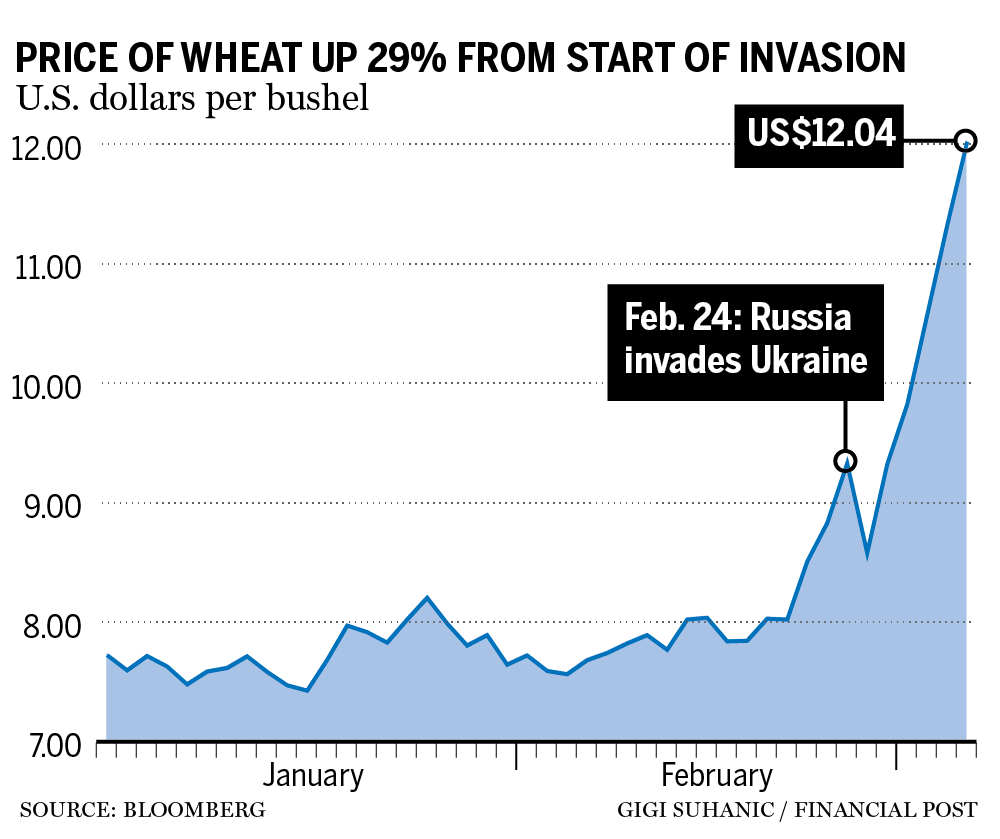The war has choked off crucial ports in the Black Sea and is displacing farmers in the region — which could disrupt the upcoming planting season

Article content
The United Nations says it is working to stabilize the situation for farmers in Ukraine in an attempt to staunch a growing food security crisis.
Advertisement
This advertisement has not loaded yet, but your article continues below.
Article content
Fears about Ukraine’s agriculture sector have driven volatility in global grain markets ever since Russia’s invasion more than a week ago. The region is one of the world’s most important bread baskets, where Ukraine and Russia combine for about a third of all wheat exports, and about 20 per cent of corn exports.
The war has choked off crucial ports in the Black Sea and is displacing farmers in the region — which could disrupt the upcoming planting season.
Before the Feb 24. invasion, Ukraine was already facing a food crisis in the eastern part of the country due to the eight-year conflict with pro-Russian separatists. Roughly 28 per cent of people in the region were struggling with access to food, according to the UN’s Food and Agriculture Organization (FAO).
Advertisement
This advertisement has not loaded yet, but your article continues below.
Article content
“While the evolving situation remains unpredictable, expectations are high of a further deterioration of food security in the east and across the country,” the FAO said in a statement on Friday.

The FAO announced plans to provide cash transfers, seeds and animal feed to farmers as a way of protecting “agricultural livelihoods” at a crucial time for Ukraine’s food production. The organization said it needs US$50 million over the next three months to assist up to 240,000 vulnerable people in rural parts of the country.
“When a major supplier of those crops is taken out of the supply chain, the ramifications are substantial. And then there’s the human suffering,” said Alison Blay-Palmer, an associate professor at Wilfrid Laurier University who serves as UNESCO Chair on Food, Biodiversity and Sustainability Studies. “It’s hard to know where to start with this one.”
Advertisement
This advertisement has not loaded yet, but your article continues below.
Article content
Ukraine sets a cap on annual wheat exports as a way of guarding against domestic food shortages. Last fall, after a bumper crop, the country raised its cap to a record-high 25.3 million tonnes of wheat for the 2021/22 growing season, which ends in June. Ukraine’s inability to export wheat and other crops during the invasion will have consequences for Middle Eastern and African nations that depend heavily on the Black Sea region for food.
-

Mrs. Dunster’s dilemma: Volatile wheat market is putting the squeeze on bakers
-

Russia to foreign firms: stay, leave or hand over the keys: Live Ukraine updates
-

Russian-owned oil tankers reroute from Canada after ban shuts access to ports
World Food Programme (WFP) executive director David Beasley has warned that the “world cannot afford to let another conflict drive the numbers of hungry people even higher.”
Advertisement
This advertisement has not loaded yet, but your article continues below.
Article content
Egypt, for example, relies on Russia and Ukraine for 86 per cent of its wheat imports, according to 2020 figures reported by Bloomberg this week. Uncertainty and sanctions on exports from the Black Sea region have caused a spike in global commodity prices, from grains to oil, making it more expensive to source alternatives to Russian or Ukrainian goods.
WFP depends on the region for half of the wheat used in food relief programs for Yemen, Investment Monitor reported. “It is going have a dramatic impact on food costs, shipping costs, oil and fuel,” Beasley said.
Wheat futures at the Chicago Board of Trade soared past US$12 a bushel on Friday morning, up 6.6 per cent over the previous day’s price for a May contract.
• Email: jedmiston@postmedia.com | Twitter: jakeedmiston
Advertisement
This advertisement has not loaded yet, but your article continues below.


